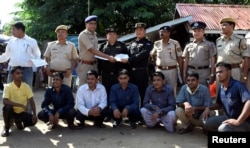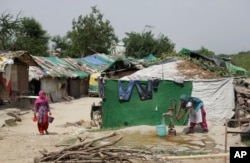India's recent deportation of seven Rohingya men to Myanmar has triggered a panic among the country’s Rohingya Muslim refugee community.
Since the seven men were deported in the past three weeks, many Rohingya refugees have gone underground in India and some others have crossed over to Bangladesh, fearing that they could be arrested, jailed or returned to Myanmar.
“After [some people] set fire to our camp in [the north Indian state of] Haryana, three times we fled to West Bengal. We lived peacefully in West Bengal for seven months. After Indian authorities deported seven Rohingyas to Myanmar we got scared. We began fearing that they could even deport us,” said Abdul Goni, 29, who two weeks ago fled a Rohingya refugee camp in West Bengal and is hiding with his wife and three children at an unidentified location in southern India.
“From Haryana, we were around 350 Rohingyas who fled to West Bengal. After the deportation of those seven men we have all fled the West Bengal camp. Some crossed over to Bangladesh. Others have fled to Jammu, Haryana and other places [in India]. I too have moved to another part of India where I am living in hiding now.”
The Indian Home Ministry, which handles the issue or refugees, declined to comment for this story.
Forced to flee
Facing discrimination and violence in Myanmar, minority Rohingya Muslims have for decades fled Myanmar to neighboring Bangladesh and other countries, including India.
Currently, approximately 40,000 Rohingya refugees live in different locations across India. About 18,000 are registered with the office of the UNHCR, the UN refugee agency.
Stateless, Rohingyas have no way to travel to any country legally and their status as refugees is not always recognized. India did not sign the 1951 U.N. Refugee Convention, and thus treats all Rohingyas entering the country as illegal immigrants.
India has jailed some Rohingyas. The UNHCR estimates more than 200 Rohingya are in Indian jails after being arrested and charged for illegal entry. Rights groups say that figure is at least 500.
The UNHCR issues identity cards to registered refugees to help prevent their arbitrary arrest, detention and deportation. But after the seven men were deported to Myanmar earlier this month, many Rohingyas in India say they fear deportation despite holding UNHCR ID cards.
Among the Rohingyas who have gone in hiding in India or fled to Bangladesh in the past few weeks, many are UNHCR card holders, said Mohammad Junaid, a Rohingya community leader in Bangladesh.
“I know of over 100 Rohingya who have fled to Bangladesh from India in the past weeks. Around 75 percent of them held refugee ID cards issued by the UNHCR Delhi. Yet, they crossed over to Bangladesh because they felt the cards could not protect them from actions by the Indian authorities,” Junaid told VOA.
Cheryl D’Souza, member of a Delhi-based legal rights activist group fighting for the rights of the refugees, also said the Rohingyas are anxious about their future in India despite holding the UNHCR cards.
"While those who have been granted refugee cards and protection by UNHCR cannot be arrested, the panic among the Rohingya regarding arrest by the Indian authorities stems from the complete denial by the government of recognizing the Rohingya as a refugee community in India that is in need of protection and the deliberate terming of them as illegal immigrants to buttress their claims in court for their expulsion,” D’Souza told VOA.
Anti-Rohingya sentiment
Rohingya refugees have lived in India peacefully for many years. But sentiment against the Muslim minority group has been surging in predominantly Hindu India after the Hindu nationalist Bharatiya Janata Party led by current Prime Minister Narendra Modi swept to power following a massive election victory in 2014.
Last year in the north Indian city of Jammu, local BJP leaders began a campaign demanding all Rohingya be expelled from the area. The BJP-led Indian federal government subsequently ordered all states to identify and deport all Rohingya Muslims from the country.
Two weeks ago, the government in India's northeastern state of Assam announced that it was preparing to deport another batch of 23 detained Rohingya that officials described as “illegal immigrants” to Myanmar.
Legal rights activist Prashant Bhushan, who is fighting against the deportation of the Rohingya refugees in India, insists that no Rohingya should be deported to Myanmar.
"A fact finding report by the United Nations Human Rights Council has concluded that [the] Myanmarese military have been responsible for committing crimes of genocide and crimes against humanity against the Rohingya. Various other international organizations have warned that conditions are not conducive for the safe return of Rohingya refugees who have been subjected to torture and detained on repatriation. It is in this context that we are opposing the deportation of the Rohingya refugees to Myanmar,” said Bhushan.
"Refoulement of the seven men to Myanmar was in grave violation of India’s international obligations. The principle of non-refoulement is [indeed] binding on India. It is enshrined in various conventions that India has ratified, such as the ICCPR [International Covenant on Civil and Political Rights] and the Convention on Rights of the Child," he said.
Myanmar's government has consistently denied allegations that its troops have committed atrocities against the Rohingya.
Altaf Hossen, a Rohingya who fled a camp in West Bengal two weeks ago and crossed over to Bangladesh, said he made a wise decision by leaving India.
“Hindu majority India is growing hostile for Muslim Rohingya refugees. We were facing violence. We held UNHCR cards. Yet, we faced threats of being deported to Myanmar,” Hossen told VOA. “India is unsafe for all Rohingyas. All Rohingyas should leave India for Bangladesh or other countries.”









